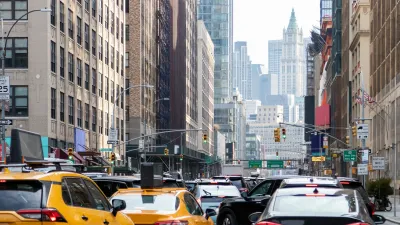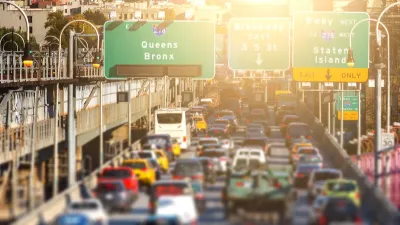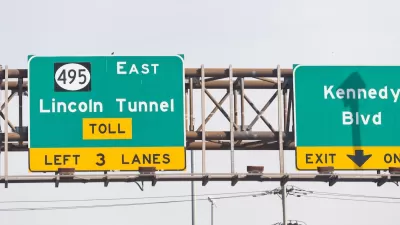We’re recognizing the scale of the global warming crisis just as there’s a parallel crisis of imagination about how to address environmental problems. Because of years of conservatives’ claims that government doesn’t work, and that the only option is to privatize and deregulate, we’re left believing that we can’t take decisive action in the public interest. We think we can do no more than charge a fee while allowing the smokestacks to keep belching. Call it tax-and-burn environmentalism: Rather than eliminating dangerous practices, tax-and-burn introduces taxes and leaves practices unreformed. Ironically, tax-and-burn often makes things easier for polluters.
We're recognizing the scale of the global warming crisis just as there's a parallel crisis of imagination about how to address environmental problems. Because of years of conservatives' claims that government doesn't work, and that the only option is to privatize and deregulate, we're left believing that we can't take decisive action in the public interest. We think we can do no more than charge a fee while allowing the smokestacks to keep belching. Call it tax-and-burn environmentalism: Rather than eliminating dangerous practices, tax-and-burn introduces taxes and leaves practices unreformed. Ironically, tax-and-burn often makes things easier for polluters. Just as critically, it fails the equity test because it restricts people with less money while not changing the behavior of those with more, jeopardizing public support for green policies.
The most recent example of tax-and-burn environmentalism is the congestion pricing proposal for lower Manhattan. In hopes of reducing drivers in what's already the most mass-transit friendly city in the US, the program would charge about eight dollars to drive into Lower Manhattan.
Promoting congestion pricing has understandably energized many environmentalists. Congestion pricing is promised to be a panacea, not only reducing emissions, but shortening commutes, encouraging cycling, ending gridlock on bridges and far out in the outer boroughs, and funding bridge repair. The icing on the cake is that politicians promise to use congestion pricing revenue to improve mass transit improvements. Green minded advocates promote congestion pricing so urgently in part because none of those goals have seemed politically feasible till now. As someone who loves bikes, hates cars, and has been knocked off the former by the latter, I can understand the attraction of congestion pricing; as a daily subway rider, I should benefit from the revenues. But we can achieve these goals more equitably, fully, and securely than through tax-and-burn policies.
The inequity of the tax-and-burn policies is their undoing. With traffic reduced, after all, it will be a much faster drive to work for all those hedge-fund Hummer drivers, market tycoon Mercedes owners and equities trading Cadillac Escalade owners. With the penny pinchers removed from the highways and bridges leading to Lower Manhattan, people who won't even notice the eight dollar charge on their American Express bill will tell their friends: Why are you taking the train? Driving has gotten much easier. The result, particularly given the pent-up demand by Wall Street traders to drive to work is likely to be fewer small cars, more big cars, a new tax, and a convenience for elites. All in the name of environmentalism.
Nor does the drive to implement elite conveniences under the smokescreen of congestion pricing stop there. Residents of elite neighborhoods in Brooklyn like Park Slope are convinced that parking problems there are the fault of outsiders -- not the fault of their own abundant cars. So, claiming that congestion pricing will lead people driving toward Manhattan to park their cars in Brooklyn and take mass transit to Manhattan, community boards are proposing resident-only parking. If you've ever tried to visit Georgetown, Cambridge, or North Beach by car, nothing says "riff raff outsiders not wanted here" better than a curb littered with "Resident ONLY" parking signs. One more nail in the coffin for democratically accessible New York streets.
So what's the alternative? Free-and-clear environmental policy. Everyone needs to pitch in to reduce greenhouse gas emissions. Not only is it unfair to allow people to buy their way out, it's ineffective because the biggest polluters typically have the most cash.
Other cities have had considerable success with free-and-clear policies that offer a carrot instead of a stick. Jeffrey Risom of Gehl Architects, a consultant to New York's plan, noted in a recent presentation that Copenhagen has made their historic downtown more bike and pedestrian friendly not by taxing, but by steadily expanding a network of bike and pedestrian-only streets and replacing parking lots with parks. Other areas have encouraged cycling with bike parking, funds to buy bikes, and inducements to take a bike instead of a company car. Isn't it logical that green policies should save people money, not tax them?
Widespread opposition to tax-and-burn policies make working people look like opponents of environmental programs. But groups representing residents of the outer boroughs can be the initiators of free-and-clear proposals. The group Sustainable South Bronx, for instance, seeks to get cars off the road by replacing a redundant highway that runs through an asthma-burdened neighborhood with a bike route. It doesn't cost residents more to travel, and it cleans the air for everyone.
Tax-and-burn policies fail on several fronts: As a tax, they hurt some citizens while failing to affect the behavior of others. As a green light for the biggest polluters, they perpetuate the use of fossil fuels. And as a focus of voter resentment, they ultimately burn up a chance to make a real difference, while threatening other green gains with a backlash. So in working for green progress, let's hold onto the principles of democracy and equity that have been the foundation of the progressive green movements that got us this far. They're values we should maintain for their own sake, but they're also prerequisites to effective and broadly supported green programs

Alabama: Trump Terminates Settlements for Black Communities Harmed By Raw Sewage
Trump deemed the landmark civil rights agreement “illegal DEI and environmental justice policy.”

Study: Maui’s Plan to Convert Vacation Rentals to Long-Term Housing Could Cause Nearly $1 Billion Economic Loss
The plan would reduce visitor accommodation by 25% resulting in 1,900 jobs lost.

Planetizen Federal Action Tracker
A weekly monitor of how Trump’s orders and actions are impacting planners and planning in America.

Wind Energy on the Rise Despite Federal Policy Reversal
The Trump administration is revoking federal support for renewable energy, but demand for new projects continues unabated.

Passengers Flock to Caltrain After Electrification
The new electric trains are running faster and more reliably, leading to strong ridership growth on the Bay Area rail system.

Texas Churches Rally Behind ‘Yes in God’s Back Yard’ Legislation
Religious leaders want the state to reduce zoning regulations to streamline leasing church-owned land to housing developers.
Urban Design for Planners 1: Software Tools
This six-course series explores essential urban design concepts using open source software and equips planners with the tools they need to participate fully in the urban design process.
Planning for Universal Design
Learn the tools for implementing Universal Design in planning regulations.
Caltrans
Smith Gee Studio
Institute for Housing and Urban Development Studies (IHS)
City of Grandview
Harvard GSD Executive Education
Toledo-Lucas County Plan Commissions
Salt Lake City
NYU Wagner Graduate School of Public Service





























